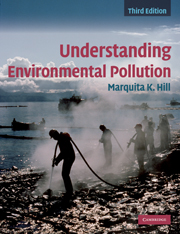Book contents
- Frontmatter
- Contents
- Preface
- Acknowledgements
- List of abbreviations and acronyms
- 1 Understanding pollution
- 2 Reducing risk, reducing pollution
- 3 Chemical toxicity
- 4 Chemical exposures and risk assessment
- 5 Air pollution
- 6 Acid deposition
- 7 Global climate change
- 8 Stratospheric ozone depletion
- 9 Water pollution
- 10 Drinking-water pollution
- 11 Solid waste
- 12 Hazardous waste
- 13 Energy
- 14 Persistent, bioaccumulative, and toxic
- 15 Metals
- 16 Pesticides
- 17 Pollution at home
- 18 Zero waste, zero emissions
- 19 Chemistry: some basic concepts
- Index
- References
1 - Understanding pollution
Published online by Cambridge University Press: 05 June 2012
- Frontmatter
- Contents
- Preface
- Acknowledgements
- List of abbreviations and acronyms
- 1 Understanding pollution
- 2 Reducing risk, reducing pollution
- 3 Chemical toxicity
- 4 Chemical exposures and risk assessment
- 5 Air pollution
- 6 Acid deposition
- 7 Global climate change
- 8 Stratospheric ozone depletion
- 9 Water pollution
- 10 Drinking-water pollution
- 11 Solid waste
- 12 Hazardous waste
- 13 Energy
- 14 Persistent, bioaccumulative, and toxic
- 15 Metals
- 16 Pesticides
- 17 Pollution at home
- 18 Zero waste, zero emissions
- 19 Chemistry: some basic concepts
- Index
- References
Summary
“The very basis for life on earth is declining at an alarming rate.”
Former UN Secretary, General Kofi AnnanChapter 1 asks some basic questions: what is pollution and why is it important? What causes pollution? Is it always harmful? How do pollutants change once in the environment? Section I emphasizes the major impacts we humans exert on Earth's natural systems while reminding us of our profound dependence on the services provided by those systems. Section II asks why pollution happens. What substances pollute and where do they come from? We look at what happens to pollutants once released, and the effects exerted, sometimes at great distances from their point of release. Section III examines the catastrophic 1984 explosion in Bhopal, India. It also considers the opposite extreme: should we be concerned about very low levels of pollutants? We then move to impoverished parts of the world where pollution sometimes devastates human health. Section IV introduces root causes of pollution – growing human populations, growing consumption, and large-scale technology. Section V asks us to face ourselves, to see that our actions have environmental consequences, sometimes in ways we don't suspect.
SECTION I
Humans are massively changing the Earth
A 1997 article in the journal, Science, “Human domination of Earth's ecosystems”, spoke of humanity's impact on the environment. See Figure 1.1 from left to right. (1) Up to one half of Earth's land surface has been transformed by human action.
- Type
- Chapter
- Information
- Understanding Environmental Pollution , pp. 1 - 33Publisher: Cambridge University PressPrint publication year: 2010
References
- 1
- Cited by



